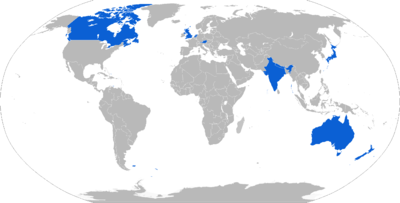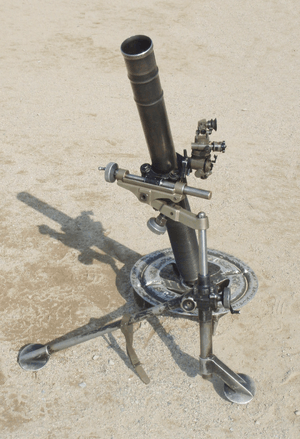L16 81mm mortar
| L16 81mm mortar | |
|---|---|
|
81mm mortar L16 | |
| Type | Mortar |
| Place of origin |
United Kingdom Canada |
| Service history | |
| Used by | See Users |
| Wars |
|
| Production history | |
| Designer | Royal Armament Research and Development Establishment, Fort Halstead (barrel and bipod) |
| Designed | 1956 |
| Manufacturer | Royal Ordnance (barrel and bipod) |
| Produced | 1965 |
| Specifications | |
| Weight | combat 35.3 kg (78 lb) |
| Barrel length | 1,280 millimetres (50 in) |
| Crew | 3 |
|
| |
| Caliber | 81 millimetres (3.2 in) |
| Action | muzzle loading |
| Breech | none |
| Recoil | baseplate and spring buffered mounting clamp |
| Rate of fire | 15rpm, 1-12 rpm sustained, 20 rpm for short periods |
| Muzzle velocity | 225 m/s (740 ft/s) |
| Effective firing range |
HE: 100 - 5,675 m (109 - 6,206 yd) Smoke: 100 - 5,675 m (109 - 6,206 yd) Flare: 400 - 4,800 m (437 - 5,249 yd) |
| Maximum firing range | 5,650 m (6,180 yd) |
| Feed system | Manual |
| Sights | Optical (C2) with Trilux illumination |
The United Kingdom's L16 81 mm mortar is the standard mortar used by the British armed forces. It originated as a joint design by the UK and Canada. The version produced and used by Australia is named the F2 81mm Mortar, whilst the version used by the U.S. armed forces is known as the M252.
It was introduced in 1965/6, replacing the Ordnance ML 3 inch Mortar in UK service, where it is used by the Army, the Royal Marines and the RAF Regiment.
In UK armoured/mechanised infantry battalions, the L16 mortar is mounted in an FV 432 AFV (six[1] per battalion mortar platoon). British army light role infantry battalions and the Royal Marines may transport their mortars in BvS 10 vehicles (the replacement for the Bv 206). Otherwise, it is carried dissassembled in three loads, (barrel, baseplate and bipod with sights, each approximately 11 kg), normally carried by a vehicle or helicopter and assembled for firing from the ground.
The weapon can be man-packed by the mortar detachment, but this is an arduous task and is preferably avoided. The ammunition in this case would be carried by other soldiers of the battalion. In addition to their normal equipment, each soldier would carry four bombs in a pair of two-bomb, plastic containers (known as greenies in the British Army).
The mortar has been used by many countries' armed forces. Versions of the M113 APC are used by many countries to transport their mortars.
Operators

Current operators
-
 Australia
Australia -
 Austria
Austria -
 Belize
Belize -
 Brazil
Brazil -
 Canada
Canada -
 Guyana
Guyana -
 India
India -
 Japan
Japan -
 Malta - Armed Forces of Malta
Malta - Armed Forces of Malta -
 Nepal
Nepal -
 Netherlands
Netherlands -
 New Zealand
New Zealand -
 Portugal
Portugal -
 United Kingdom
United Kingdom -
 Norway
Norway -
 Syria
Syria
Former operators
Gallery
 View down the smoothbore barrel of the L16 mortar
View down the smoothbore barrel of the L16 mortar L16 baseplate
L16 baseplate L16 sight
L16 sight- L16 mortar of the Japan Ground Self-Defense Force
References
- ↑ Richard A. Rinaldi. "MODERN BRITISH TOE’S" (PDF). Retrieved 27 February 2013.
External links
| Wikimedia Commons has media related to L16 81mm mortar. |
